Closed comedones, also known as whiteheads, are acne lesions that occur when a pore becomes blocked.
This happens when sebum and dead skin cells meant to lubricate the skin and shed from the surface accumulate inside the pore, creating a visible bump covered with a thin layer of skin.
Luckily, closed comedones are a condition that can be treated with tretinoin.
Tretinoin helps unclog pores and encourages the skin cells to shed, which reduces the appearance of closed comedones.
In this article, I will talk about what causes closed comedones, how tretinoin works to treat closed comedones and some gentler alternatives that can help you get rid of closed comedones with significantly less irritation.

What Causes Closed Comedones?
As I already mentioned above, closed comedones are caused by a buildup of oil and dead skin cells inside the pore.
When the pore becomes completely clogged, a closed comedone forms. They often start out painless, but they can turn into painful, red pimples if bacteria get in.
Closed comedones (whiteheads) are similar to open comedones (blackheads). Both are considered as grade I non-inflammatory acne, but they look different from one another.
Open comedones turn black when exposed to air, while a closed comedone remains “closed” because a thin layer of skin over the plug prevents it from opening up.
A few major causes of closed comedones include:
Oil-Based Skincare & Makeup Products
Heavy, oil-based skincare and makeup products that clog the pores and prevent the normal sebum flow are the most common culprit of closed comedones.
The first step in treating closed comedones is eliminating products that trigger them.
Go through the ingredient lists of products you are using and try to figure out which ones might be causing you an issue.
Overly Dehydrated Skin
Overly dehydrated skin is another common culprit of closed comedones.
When the skin gets dehydrated from stripping products that contain drying ingredients such as alcohol, it tends to overproduce sebum at an abnormal rate to compensate for the dryness.
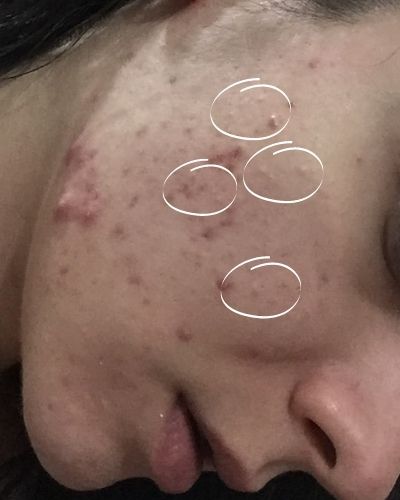
Dehydration has always been the case with my closed comedones. As you can see from the photo above, my skin here was incredibly dehydrated but would get super oily after only a couple of hours of cleansing.
Besides cystic acne, I also had a ton of closed comedones (circled in white), and old scars that would take ages to go away because of how dehydrated and damaged my skin barrier was.
My issues cleared after eliminating a few harsh and stripping products from my skincare routine, and I focused on improving my hydration.
Excessive Sebum Production
Excessive sebum production can be due to hormonal imbalances and mainly occurs when the male group of hormones known as androgens are overactive and stimulate the oil-producing glands.
Excessively oily skin doesn’t always cause full-blown cystic acne because acne is a bacterial condition and not necessarily an oily skin condition.
However, excessively oily skin definitely causes blackheads and closed comedones (or whiteheads) because the excess oil needs to be exfoliated and cleared out of the pores.
Sebum works great to lubricate the skin’s surface, but the problem starts when there’s too much of it inside the pores, which ends up blocking fresh sebum secreted by the sebaceous glands from traveling to the surface.
So, sebum = good, sebum stuck inside the pores = bad.
Accumulation of Dead Skin Cells
Accumulation of dead skin cells that don’t shed properly can also get mixed up with hardened sebum inside the pore and be another addition to the formation of closed comedones.
This is what we call “cellular debris” because these are things that should go to the skin’s surface and eventually be shed or cleansed instead of remaining inside the pore, where they can cause a bacterial issue.
Environmental Factors
Environmental factors such as pollution that accumulates on the skin and excessive sun exposure that alters the skin’s chemistry are also some of the main players in the formation of closed comedones.
Diet and Lifestyle
And lastly, food allergies and intolerance, as well as damaging lifestyle habits such as smoking, could also be the cause of closed comedones.
How Does Tretinoin Work to Treat Closed Comedones?
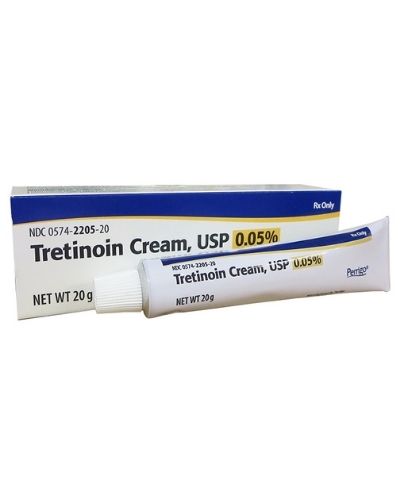
Tretinoin speeds up cell turnover (the rate that your skin produces new cells and sheds them from its surface.)
Therefore, after starting tretinoin, your skin cells will travel faster to the surface, purging clogs in the process and revealing a brighter, smoother, healthier, and more unified complexion.
Alternative Treatments for Clearing up Closed Comedones
Since closed comedones occur when a pore becomes blocked with sebum and skin cells, the best treatments for clearing them up are products containing exfoliating acids that will work to unclog pores and topical retinoids that will increase cellular turnover.
Here are the best ingredients for clearing up closed comedones:
Salicylic Acid
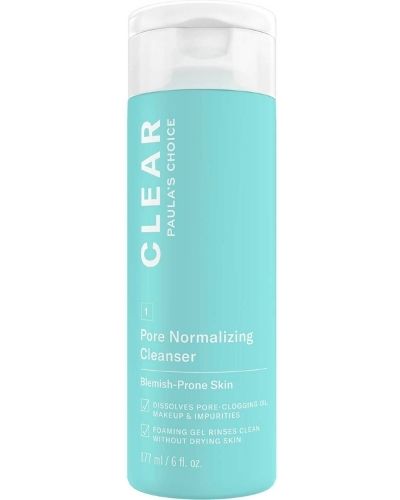
Best salicylic acid: Paula’s Choice – CLEAR Anti Redness Exfoliating Solution.
Salicylic acid is a basic and straightforward ingredient that can help address several skin concerns with regular use.
Salicylic acid is a beta-hydroxy acid (BHA) and an oil-soluble component that can cut through the superficial skin oil and travel deeper into the pores, where it will dissolve the gunk made up of dead skin cells, white blood cells, oil, and other cellular debris, that’s causing the pore to clog.
This will, in turn, allow for our natural oil to flow freely out of the pores instead of remaining stuck inside and causing issues such as blackheads, closed comedones, and cystic acne.
Salicylic acid is truly an amazing ingredient; however, you have to continue using it to continue seeing results as your skin is likely to come back to the same old if you stop using it for a longer period of time.
Mandelic Acid
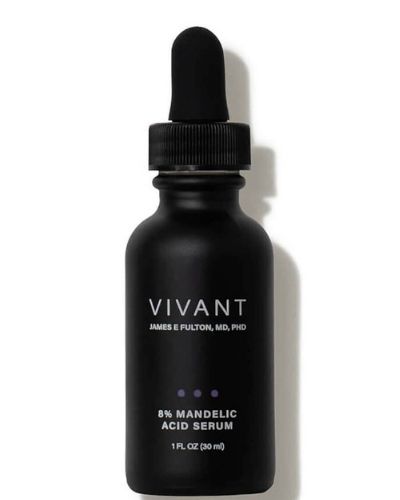
Best mandelic acid: Vivant – 8% Mandelic 3-in-1 Serum.
Mandelic acid is an alpha hydroxy acid (AHA) used to exfoliate the skin and address skin issues such as acne, hyperpigmentation, sun damage, and visible signs of aging.
It’s one of the mildest AHAs, making it suitable for sensitive skin, but it also has the ability to work inside the pore and not just on the surface of the skin.
This means that mandelic acid won’t only eliminate the superficial issue of closed comedones but will actually address their cause which starts inside the pore.
Lactic Acid
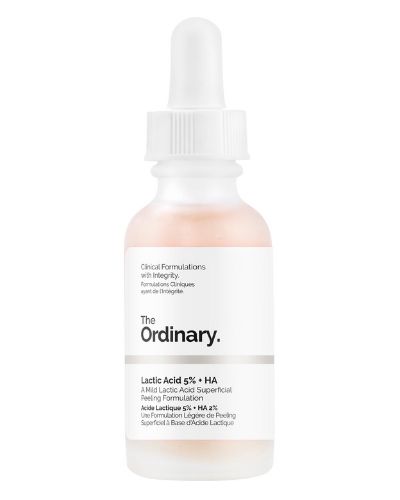
Best lactic acid: The Ordinary – Lactic Acid 5%.
Lactic acid is an exfoliating acid that belongs to alpha-hydroxy acids (AHAs).
This ingredient is derived from sour milk or sugar-rich foods, and it’s a water-soluble substance that possesses larger molecules, making it slightly different than other AHAs, for example, glycolic acid.
Due to its large molecules, lactic acid won’t penetrate deeper into the skin and will instead work on the surface, which means it will provide lighter exfoliation, making it more suitable for sensitive skins and those dealing with closed comedones.
Lactic acid is milder than other AHAs, and it can also be used alongside other actives as it is usually very well tolerated by all skin types.
Some benefits of using lactic acid include smoother and more uniform complexion, improved hyperpigmentation, evened-out skin tone, refined texture, and healthy and glowing skin.
Over-The-Counter Retinoids
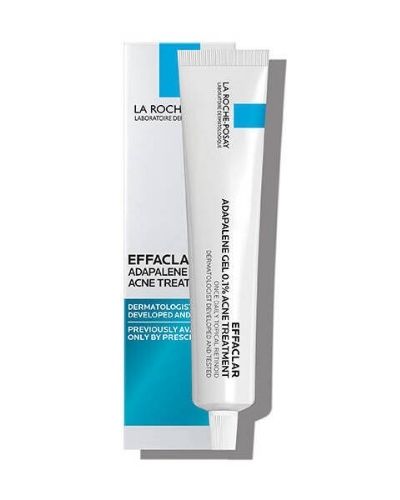
Best retinoid for sensitive, acne-prone skin: La Roche Posay – Adapalene 0.1%.
If, for some reason, you don’t want to or can’t get on tretinoin at the moment, other over-the-counter retinoids such as adapalene and retinol can also help get rid of closed comedones.
These are also vitamin A derivatives and they work in a similar way to tretinoin with the only difference being that they are significantly milder.

My name is Simone and I am a certified skin specialist. I created this website to teach my readers how to take great care of their skin and I also like to occasionally share my honest opinions on skincare products I’ve tried. You can learn more about me here.
